Key takeaways:
- Identifying triggers of burnout, like tight deadlines and perfectionism, helps in managing stress and maintaining creativity.
- Implementing structured and intentional breaks can rejuvenate focus and unleash creative potential.
- Engaging in mindfulness practices, such as meditation and deep breathing, enhances clarity and reduces anxiety during the editing process.
- Celebrating small achievements fosters motivation and allows for recognizing progress throughout the editing journey.
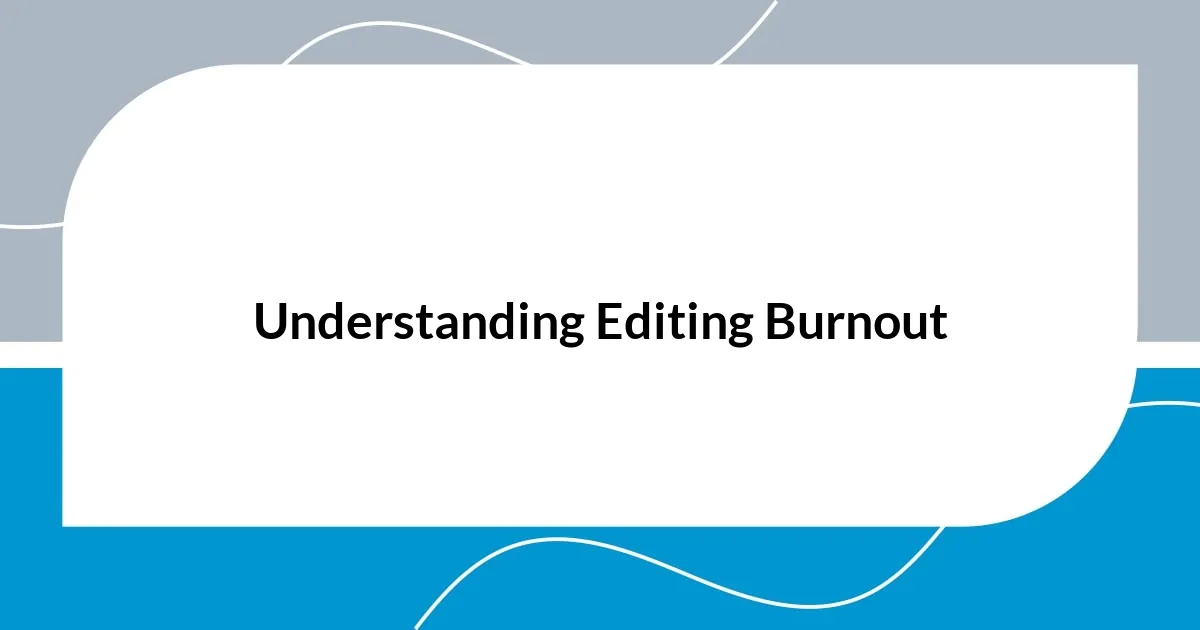
Understanding Editing Burnout
Editing burnout is a feeling many of us can relate to. It sneaks up on you, often disguised as fatigue or a lack of inspiration. I remember staring at a manuscript, the words blurring together, and asking myself—how did I get here? It’s easy to lose the spark when you’re buried under layers of correction and revision.
What struck me deeply during my own experience with editing burnout was the emotional toll it took. I found myself irritable and easily frustrated, not just with my work but also with the people around me. Have you ever felt that exhaustion seep into your interactions, like every conversation became a chore? It was during those moments that I realized how crucial it was to recognize burnout before it spiraled out of control.
The pressure to meet deadlines and maintain high standards can be overwhelming. As I sifted through what felt like an endless sea of text, the joy of storytelling diminished. I’d often wonder, is all this hard work really worth it? These reflections were pivotal. Understanding that editing burnout isn’t just about tired eyes or mental exhaustion—it’s about grappling with our passion for storytelling—helped me begin to formulate a way out.
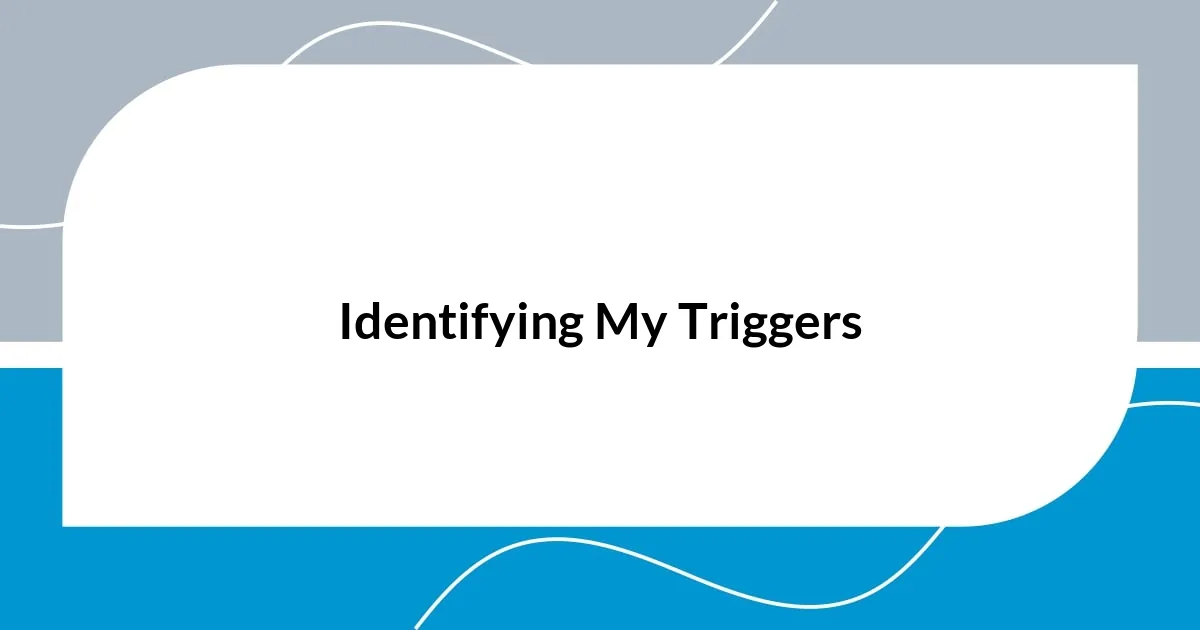
Identifying My Triggers
Identifying my triggers was a game changer in my battle against editing burnout. I started to journal my feelings while working, and I quickly spotted patterns. For instance, I noticed that late nights and tight deadlines always left me feeling drained. It’s like I could almost predict when my motivation would wane; the fatigue turned into frustration, and I knew I had hit a wall.
One particular instance stands out for me. I had been working on a project that demanded perfection—every word scrutinized and polished. After hours of editing, my enthusiasm fizzled, and I recalled feeling anxious and overwhelmed. Recognizing that my self-imposed pressure was a major trigger helped me take a step back and breathe. Have you ever found yourself thinking that quitting was easier than pushing through? It can be an eye-opener to admit that our triggers are often rooted in our expectations.
Establishing a clearer boundary between work and relaxation became essential. I realized that certain times of the day, like the early morning hours, were my most productive. However, whenever I worked too late, I often fell into the trap of repetitive editing without making meaningful progress. Identifying these triggers allowed me to create a sustainable editing routine that feels both manageable and fulfilling.
| Trigger | Impact |
|---|---|
| Late Nights | Increased Fatigue |
| Tight Deadlines | Heightened Anxiety |
| Perfectionism | Creative Block |
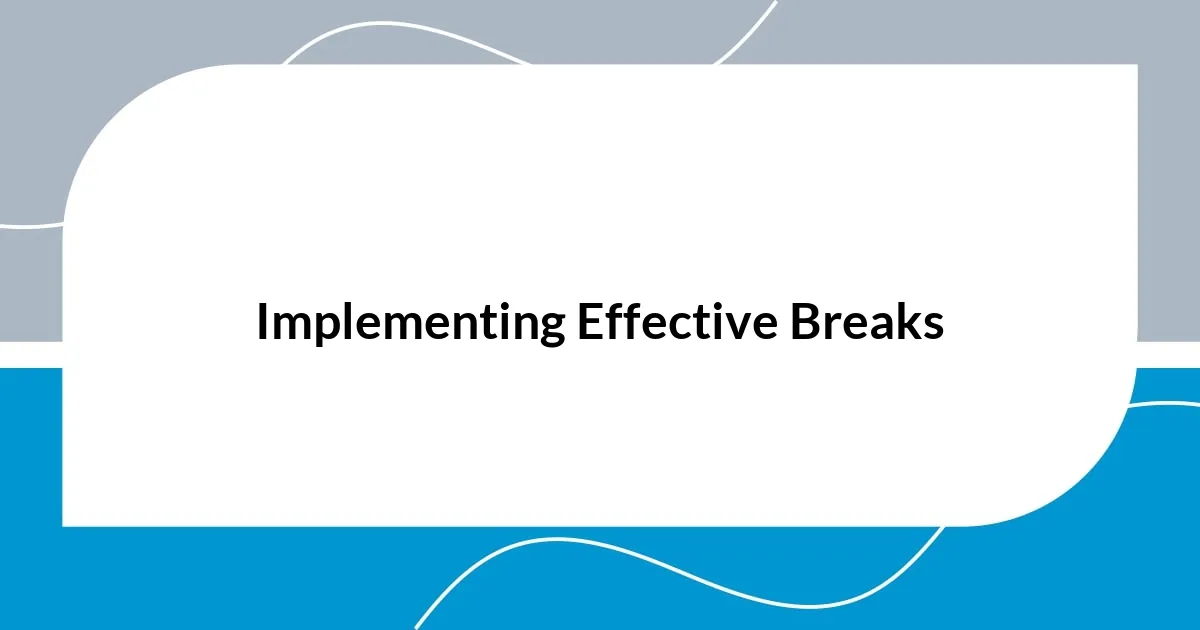
Implementing Effective Breaks
Taking effective breaks was crucial for me in overcoming editing burnout. I learned the hard way that simply stepping away from my work was not enough; I needed to be intentional with my breaks. For instance, I used to get up, stretch, and grab a drink, only to find that my mind was still racing with thoughts about my edits. It took time for me to realize that the quality of my breaks mattered as much as the breaks themselves.
Incorporating structured breaks allowed me to recharge my focus and creativity. During one break, I took a quick walk outside. The fresh air and physical movement rejuvenated my mind. In that moment, I understood how much I had been stifling my creativity. I got to reconnect with my surroundings, and it sparked some unexpected breakthrough ideas for my editing work.
Here are a few effective strategies I’ve enjoyed incorporating into my breaks:
- Nature Walks: Stepping outside for a short walk can clear your mind and inspire fresh thoughts.
- Mindful Breathing: Spend a few minutes focusing solely on your breath to help reduce anxiety and refocus your mind.
- Movement Breaks: Engage in quick exercises, like stretching or light yoga, to relieve tension and reignite energy.
- Creative Distractions: Try drawing or doodling for a few minutes; it can help shift your mindset and loosen up your thoughts.
- Digital Detox: During breaks, avoid screens entirely. Instead, read a book or listen to music to refresh your mind.
Implementing these strategies helped me break the cycle of burnout and return to my work with a clearer, more creative mindset.
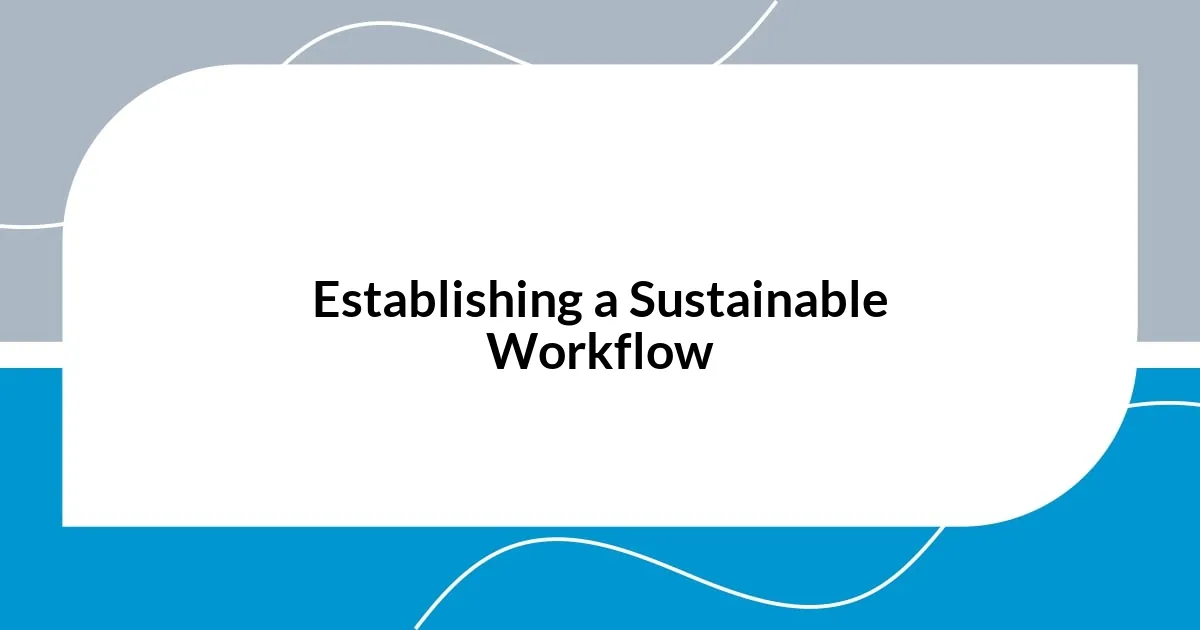
Establishing a Sustainable Workflow
Establishing a sustainable workflow transformed how I approached my editing projects. I learned early on that a haphazard schedule only led to chaos and burnout. That’s when I decided to set specific working hours for my editing tasks, treating them like appointments I couldn’t miss. Have you ever felt the pressure building at the end of a long day? Trust me, knowing when to step away made a significant difference in how I viewed my workload.
I also discovered the power of setting realistic goals for each session. I started breaking my editing tasks into smaller, manageable chunks. For example, instead of devoting an entire day to a single project, I now focus on editing specific sections with a definite timeline in mind. It’s incredible how eliminating that overwhelming feeling of needing to finish everything at once can allow creativity to flow more freely. I find that accomplishing even a few minor goals in a day gives me a sense of progress and accomplishment.
Lastly, I embraced the concept of flexibility within my routine. Life happens, and sometimes edits take longer than expected. Accepting this allowed me to adjust my plan without guilt. Instead of beating myself up for not finishing on time, I ask myself: what can I do differently next time? This mindset promotes resilience, making my editing process not just sustainable, but enjoyable.
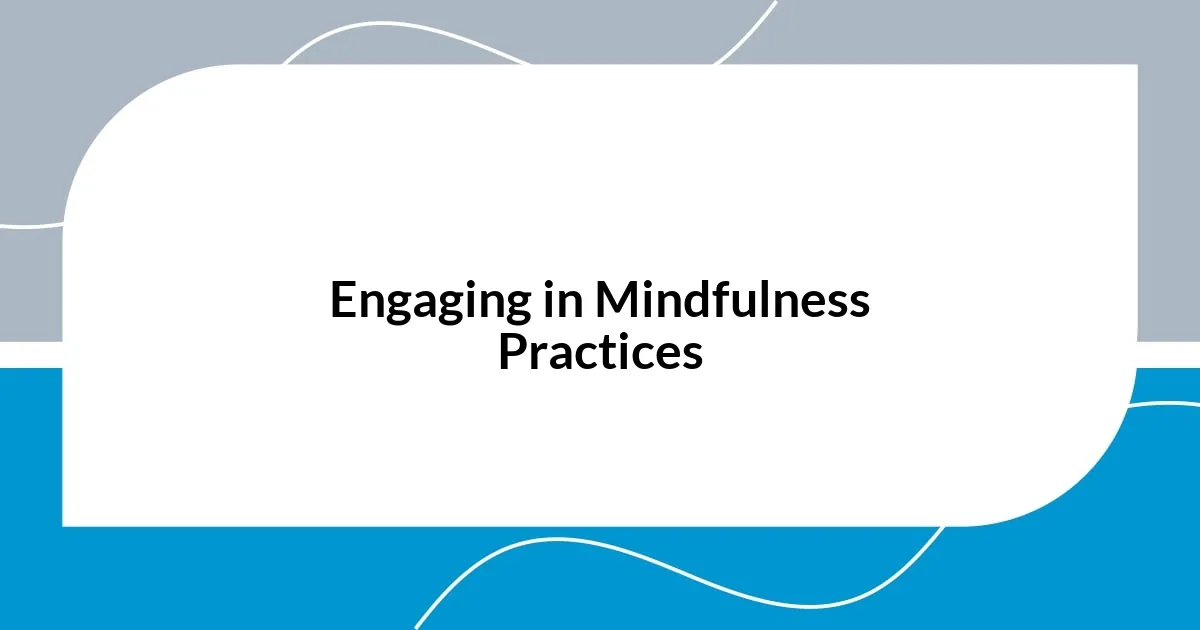
Engaging in Mindfulness Practices
Engaging in mindfulness practices became a lifeline when I was grappling with editing burnout. I remember a particularly taxing week when anxiety seemed to grip me tighter with each passing hour. In those moments, I began focusing on deep, mindful breathing—something as simple as inhaling for four seconds, holding for four seconds, and exhaling for six. It felt almost miraculous how this small adjustment brought instant clarity amidst the chaos, like a gentle hand calming a storm.
Another mindfulness strategy I embraced was meditation. I recall sitting on my living room floor, eyes closed, trying to quiet my racing thoughts. At first, it felt awkward and challenging, but I persevered. Over time, I noticed that even a five-minute session could help ground me. I began to realize that my thoughts didn’t have to control me; I could observe them without judgment. Isn’t it fascinating how a bit of stillness can open up a world of clarity and creativity?
I also found value in integrating mindfulness into my editing sessions. When I caught myself losing focus or growing frustrated, I would pause for a moment, close my eyes, and simply tune into my senses. What did I hear? What did I feel? This practice shifted my attention away from what wasn’t working toward what inspired me. Each time I did this, I returned to my work feeling refreshed and more connected to my creative flow. It’s incredible how being present can spark new ideas and overcome burnout.
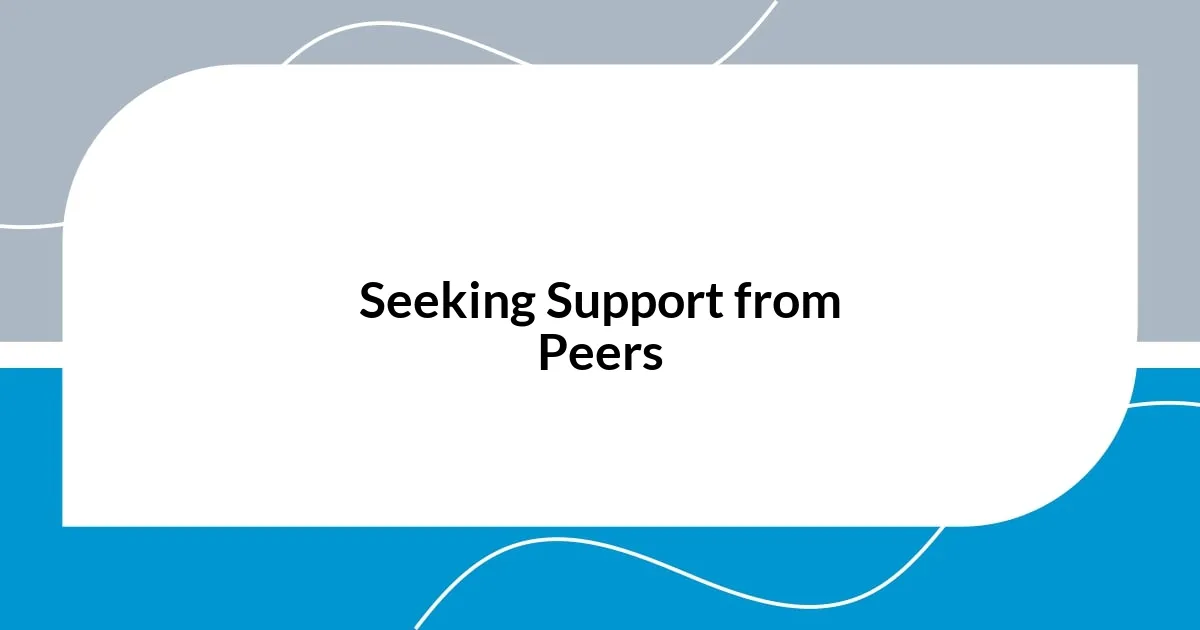
Seeking Support from Peers
Connecting with peers became a cornerstone of my recovery from editing burnout. I remember feeling isolated, as if my struggles were unique to me. One day, I decided to reach out to a fellow editor for coffee. Sharing my experiences and listening to theirs was a revelation—it turned out they faced similar challenges. Isn’t it comforting to realize you’re not alone in your struggles? Just that simple act of talking lightened my emotional load and fueled my motivation.
I also joined a local writers’ group, where we exchanged feedback on each other’s projects. Initially, I was hesitating to share my work, worried about what others might think. But when I finally opened up, I was blown away by the support and insights offered. Not only did this foster accountability, but hearing fresh perspectives reignited my creativity. Have you ever tried joining a community of like-minded individuals? It can be a game changer when it comes to overcoming isolation and rediscovering inspiration.
The most impactful support came from a close friend who understood my passion for editing but also my struggles with it. We made it a routine to check in on each other’s progress every week. Those conversations went beyond work; they became sessions of laughter, shared frustrations, and encouragement. It was like having a built-in cheerleader who truly understood the highs and lows of the editing process. I discovered that leaning on friends not only provided emotional support but also helped normalize my experiences. Have you thought about who in your life might be a valuable ally during tough times?
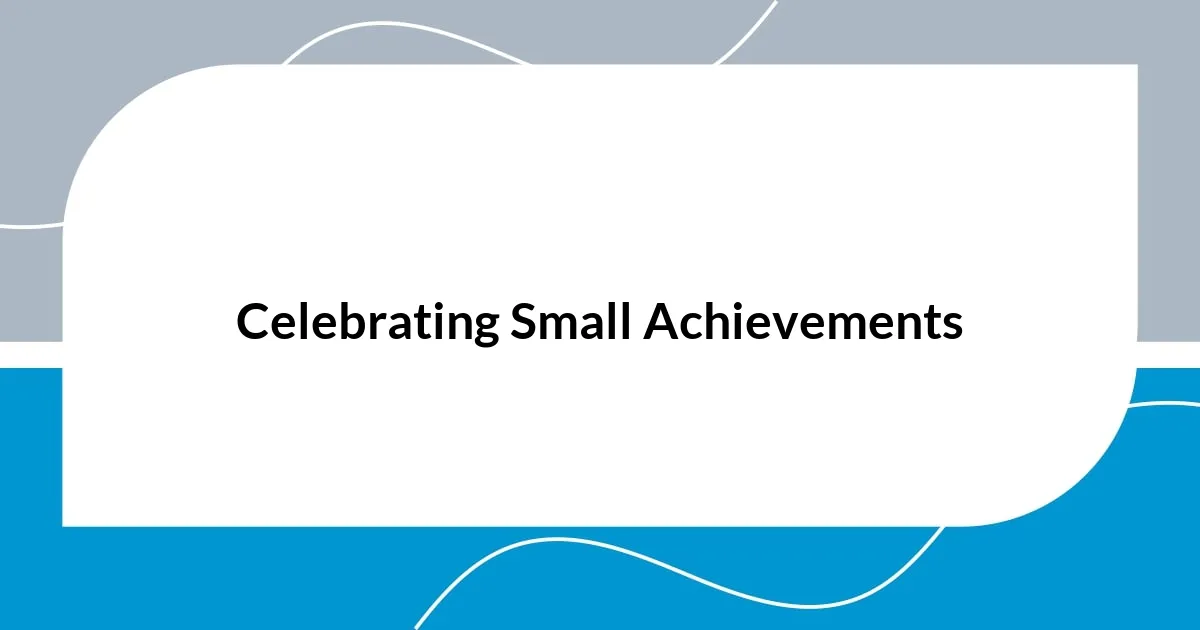
Celebrating Small Achievements
Celebrating small achievements is like sprinkling joy throughout the editing process. I recall the first time I completed a challenging chapter; I took a moment to savor that victory. Instead of moving on to the next task immediately, I treated myself to my favorite coffee. That simple act made a world of difference, reinforcing the notion that every milestone, no matter how small, deserves recognition.
Another time, I set a goal to edit a certain number of pages in a day. When I made it, I didn’t just move on to my next task. I paused and shared my accomplishment on social media. The supportive comments flooded in, and it felt uplifting to have my small win celebrated by others. It’s incredible how validating it can be to voice your successes, even if they seem trivial.
I’ve learned to create a small ritual each time I finish a task. Sometimes, it’s just a moment of gratitude or a quick dance around my living room. I ask myself, “How does recognizing this achievement make me feel?” I realize it fuels my motivation for the next challenge ahead. By carving out time to celebrate what I’ve accomplished, I not only acknowledge my hard work but also reinvigorate my passion for editing, making the journey all the more enjoyable.